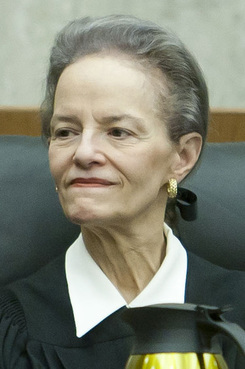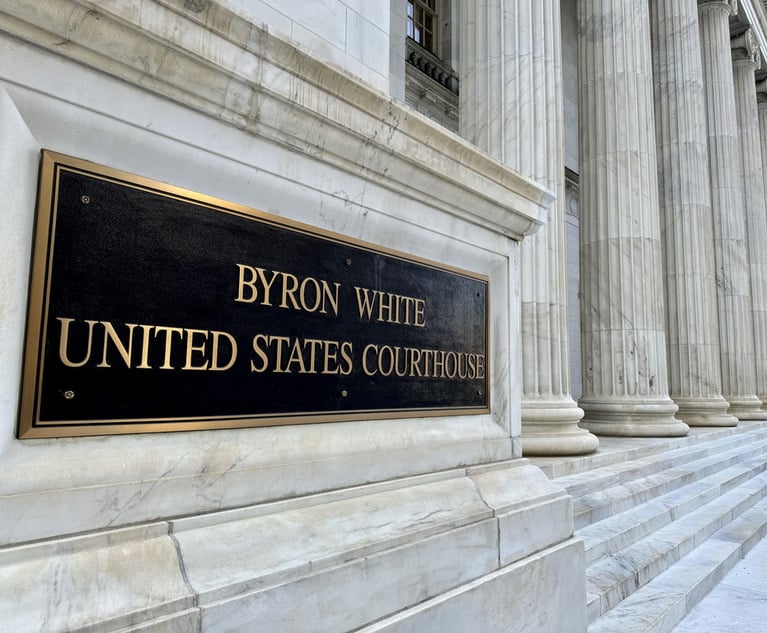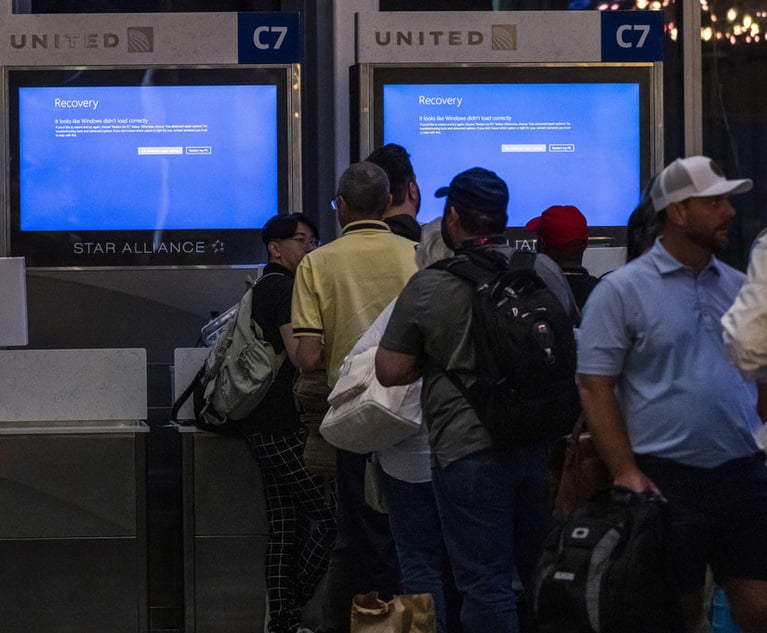Brett Kavanaugh 'Looks for Ways to Rule for Employers'
Advocates for business interests would find comfort in a would-be justice who could move the court from reliably pro-business to more resoundingly so. Worker advocates, meanwhile, are sounding alarms as Kavanaugh's nomination, to succeed Justice Anthony Kennedy, advances in the U.S. Senate.
July 12, 2018 at 11:59 AM
7 minute read
The original version of this story was published on National Law Journal
 Supreme Court nominee Judge Brett Kavanaugh meeting with Senator Lindsey Graham (R-SC), on July 11, 2018. Credit: Diego M. Radzinschi / ALM
Supreme Court nominee Judge Brett Kavanaugh meeting with Senator Lindsey Graham (R-SC), on July 11, 2018. Credit: Diego M. Radzinschi / ALM
A SeaWorld trainer drowned in 2010 when a killer whale pulled her beneath the water during a live show, marking the third fatal attack during a performance and sparking an investigation into employment risks at the Florida theme park.
Federal occupational safety regulators faulted SeaWorld of Florida LLC for exposing its trainers to recognized hazards, and the case made its way to the U.S. Court of Appeals for the D.C. Circuit. The court in 2014, ruling for the Occupational Safety and Health Administration, said SeaWorld failed to take steps to protect employees from the hazards posed by close contact between trainers and killer whales. The appeals panel was sharply divided.
Writing in dissent was Brett Kavanaugh, the longtime D.C. Circuit judge who is now poised to join the U.S. Supreme Court. His SeaWorld dissent and other cases siding with the employer telegraphs how he might approach labor and employment issues presented to the Supreme Court. The majority's decision, Kavanaugh warned, could allow OSHA to regulate Nascar races and NFL games.
The broad question the case raised, as Kavanaugh put it: “When should we as a society paternalistically decide that the participants in these sports and entertainment activities must be protected from themselves—that the risk of significant physical injury is simply too great even for eager and willing participants? And most importantly for this case, who decides that the risk to participants is too high?”
The majority found there was ample evidence showing SeaWorld recognized its precautions were not adequate to prevent harm or death to trainers, and that employees could be protected without harming the business.
Advocates for business interests would find comfort in a would-be justice who could move the court from reliably pro-business to more resoundingly so. Worker advocates, meanwhile, are sounding alarms as Kavanaugh's nomination, to succeed Justice Anthony Kennedy, advances in the U.S. Senate.
Sharon Block, a former Obama-era National Labor Relations Board member, said in a post at the blog On Labor that Kavanaugh's D.C. Circuit record “demonstrates consistent support for the interests of employers and a lack of concern for the interests of workers and the government agencies” that are protecting worker rights.
“What stands out about Kavanaugh's record in labor cases is not just his consistency in ruling for employers over workers, but the seemingly unnecessary positions he sometimes takes when doing so,” Block wrote.
Kavanaugh's critics point to myriad rulings to argue he tends to favor employers over employees. In the case American Federation of Government Employees v. Gates, Kavanaugh in 2007 said the secretary of defense was empowered to abolish collective bargaining altogether. More recently, in 2012, Kavanaugh dissented in the case Miller v. Clinton, where the majority revived a State Department employee's age-discrimination claims.
“To be sure, Congress could (and perhaps should) change the law and bar the State Department from imposing mandatory retirement in these kinds of circumstances,” Kavanaugh wrote. He added: “But our job is to apply and enforce the law as it is written.”
Kavanaugh's SeaWorld Dissent Dings Regulators
Kavanaugh's dissent in the SeaWorld case opened with a laundry list of professions that carry risk: “Football. Ice hockey. Downhill skiing. Air shows. The circus. Horse racing. Tiger taming. Standing in the batter's box against a 95 mile per hour fastball. Bull riding at the rodeo.” (And this was to name only some, as Kavanaugh carried his point a bit further.)
“The participants in those activities want to take part, sometimes even to make a career of it, despite and occasionally because of the known risk of serious injury. To be fearless, courageous, tough—to perform a sport or activity at the highest levels of human capacity, even in the face of known physical risk—is among the greatest forms of personal achievement for many who take part in these activities,” Kavanaugh wrote. “American spectators enjoy watching these amazing feats of competition and daring, and they pay a lot to do so.”
He said that although safety precautions must be in place, the Labor Department is not the proper body to decide these issues. Regulators, he said, do not have the authority to make these decisions.
“Why isn't close contact between trainers and whales as intrinsic to SeaWorld's aquatic entertainment enterprise as tackling is to football or speeding is to auto racing? The department offers no answer at all,” Kavanaugh wrote.
 Judge Judith Rogers
Judge Judith RogersJudge Judith Rogers, writing for the majority, turned down Kavanaugh's notion that OSHA had an “all or nothing” regulatory demand on its shoulders—the idea that the agency could not regulate SeaWorld if it did not also police the NFL.
“No principle of law requires a court, when reviewing a citation based on specific facts relating to one of several kinds of entertainment shows put on by a single employer, to reach beyond that citation and decide the hypothetical application of the statute to another industry,” Rogers wrote.
Rogers said at one point in her ruling: “We note, however, that had Congress intended all unsafe and unhealthy performances in the entertainment industry to be beyond the scope of employee protection, it could have included such an exemption in the Occupational Safety and Health Act, and it did not.”
A lawyer for SeaWorld, Eugene Scalia of Gibson, Dunn & Crutcher, was not reached for comment.
Fisher Phillips partner Richard Meneghello said Kavanaugh's appointment to the Supreme Court would solidify the pro-business leanings of the Roberts Court.
“This court will go from a reliably pro-business court to being solidly pro-business. It will be an uphill battle for employees to win many cases, if he gets confirmed,” Meneghello said. “He looks for ways to rule for employers.”
Brian Markovitz of Joseph, Greenwald & Laake, who represents victims of workplace injuries, predicted Kavanaugh's arrival at the Supreme Court—if he's confirmed—would usher in more 5-4 rulings.
“That's the real travesty of this situation. There was a point in time where the court viewed and based decisions on judicial scholarship and thought,” he said. “Now, it's almost full politics.”
Read more:
Kavanaugh Might Have Recusal Problems If These Cases Reach SCOTUS
Brett Kavanaugh Has Long Questioned Agency Power. Just Look at His First Opinion.
Confirmation Team Takes Shape, Boosted by Former Kavanaugh Clerks
Former Clerks: Kavanaugh Doesn't 'Search for an Easy Answer'
Akhil Amar, Liberal Prof at Yale Law, Would Testify for Kavanaugh If Asked
This content has been archived. It is available through our partners, LexisNexis® and Bloomberg Law.
To view this content, please continue to their sites.
Not a Lexis Subscriber?
Subscribe Now
Not a Bloomberg Law Subscriber?
Subscribe Now
NOT FOR REPRINT
© 2025 ALM Global, LLC, All Rights Reserved. Request academic re-use from www.copyright.com. All other uses, submit a request to [email protected]. For more information visit Asset & Logo Licensing.
You Might Like
View All
2nd Circuit Clarifies When 'Pay-for-Delay' Deals Are Legal in Tossing Antitrust Claims

'Tip of the Iceberg': Appellate Ruling Provides Roadmap for Bias Suits Over DEI Training

Does TikTok's Algorithm Fall Under Section 230 Immunity? 3rd Circuit to Decide
Trending Stories
Who Got The Work
Michael G. Bongiorno, Andrew Scott Dulberg and Elizabeth E. Driscoll from Wilmer Cutler Pickering Hale and Dorr have stepped in to represent Symbotic Inc., an A.I.-enabled technology platform that focuses on increasing supply chain efficiency, and other defendants in a pending shareholder derivative lawsuit. The case, filed Oct. 2 in Massachusetts District Court by the Brown Law Firm on behalf of Stephen Austen, accuses certain officers and directors of misleading investors in regard to Symbotic's potential for margin growth by failing to disclose that the company was not equipped to timely deploy its systems or manage expenses through project delays. The case, assigned to U.S. District Judge Nathaniel M. Gorton, is 1:24-cv-12522, Austen v. Cohen et al.
Who Got The Work
Edmund Polubinski and Marie Killmond of Davis Polk & Wardwell have entered appearances for data platform software development company MongoDB and other defendants in a pending shareholder derivative lawsuit. The action, filed Oct. 7 in New York Southern District Court by the Brown Law Firm, accuses the company's directors and/or officers of falsely expressing confidence in the company’s restructuring of its sales incentive plan and downplaying the severity of decreases in its upfront commitments. The case is 1:24-cv-07594, Roy v. Ittycheria et al.
Who Got The Work
Amy O. Bruchs and Kurt F. Ellison of Michael Best & Friedrich have entered appearances for Epic Systems Corp. in a pending employment discrimination lawsuit. The suit was filed Sept. 7 in Wisconsin Western District Court by Levine Eisberner LLC and Siri & Glimstad on behalf of a project manager who claims that he was wrongfully terminated after applying for a religious exemption to the defendant's COVID-19 vaccine mandate. The case, assigned to U.S. Magistrate Judge Anita Marie Boor, is 3:24-cv-00630, Secker, Nathan v. Epic Systems Corporation.
Who Got The Work
David X. Sullivan, Thomas J. Finn and Gregory A. Hall from McCarter & English have entered appearances for Sunrun Installation Services in a pending civil rights lawsuit. The complaint was filed Sept. 4 in Connecticut District Court by attorney Robert M. Berke on behalf of former employee George Edward Steins, who was arrested and charged with employing an unregistered home improvement salesperson. The complaint alleges that had Sunrun informed the Connecticut Department of Consumer Protection that the plaintiff's employment had ended in 2017 and that he no longer held Sunrun's home improvement contractor license, he would not have been hit with charges, which were dismissed in May 2024. The case, assigned to U.S. District Judge Jeffrey A. Meyer, is 3:24-cv-01423, Steins v. Sunrun, Inc. et al.
Who Got The Work
Greenberg Traurig shareholder Joshua L. Raskin has entered an appearance for boohoo.com UK Ltd. in a pending patent infringement lawsuit. The suit, filed Sept. 3 in Texas Eastern District Court by Rozier Hardt McDonough on behalf of Alto Dynamics, asserts five patents related to an online shopping platform. The case, assigned to U.S. District Judge Rodney Gilstrap, is 2:24-cv-00719, Alto Dynamics, LLC v. boohoo.com UK Limited.
Featured Firms
Law Offices of Gary Martin Hays & Associates, P.C.
(470) 294-1674
Law Offices of Mark E. Salomone
(857) 444-6468
Smith & Hassler
(713) 739-1250







